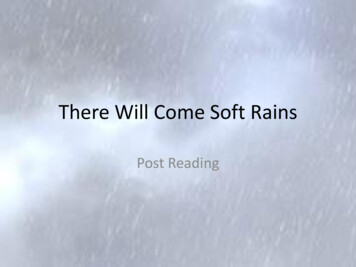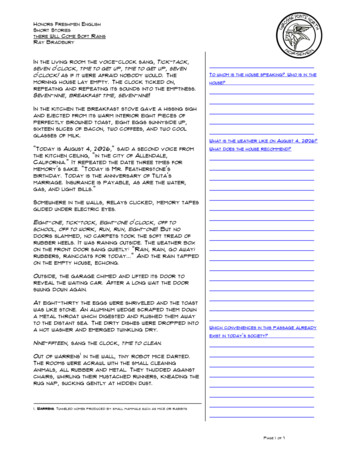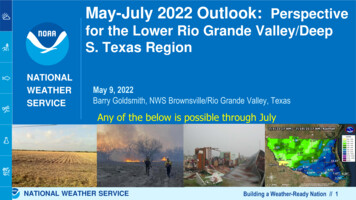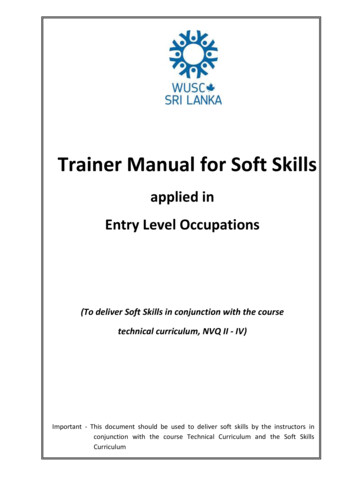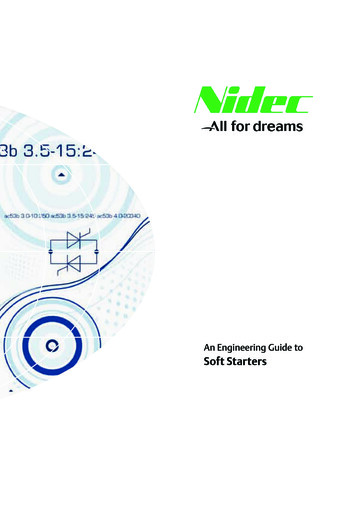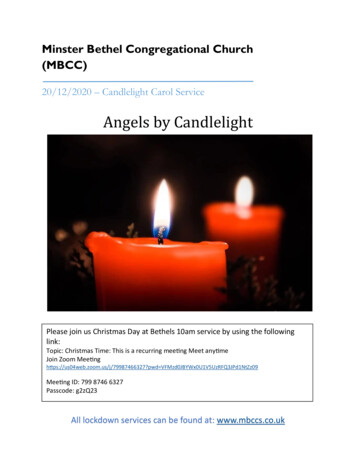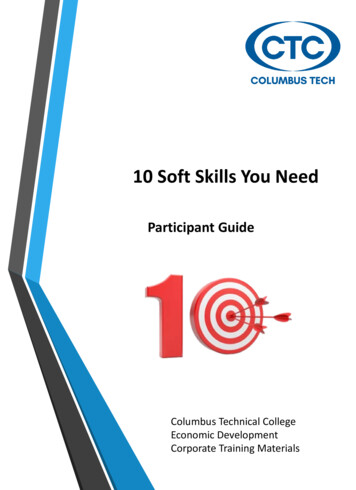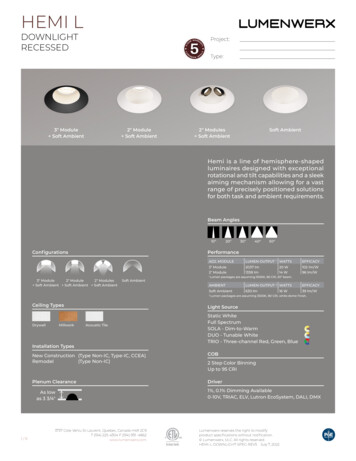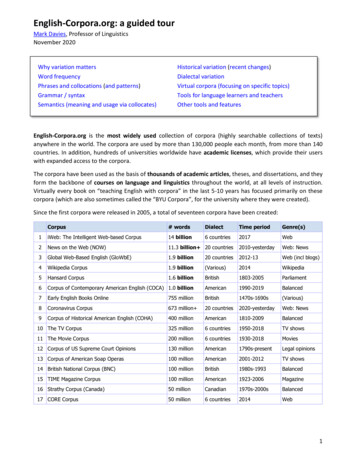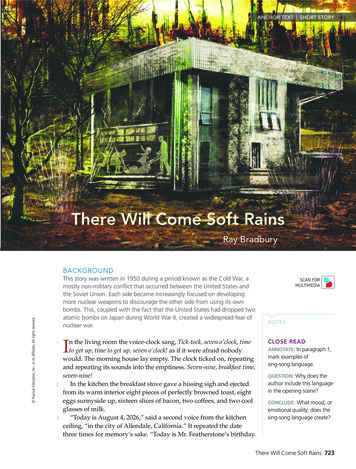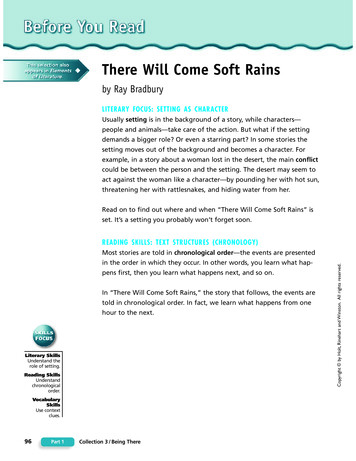
Transcription
There Will Come Soft Rainsby Ray BradburyLITERARY FOCUS: SETTING AS CHARACTERUsually setting is in the background of a story, while characters—people and animals—take care of the action. But what if the settingdemands a bigger role? Or even a starring part? In some stories thesetting moves out of the background and becomes a character. Forexample, in a story about a woman lost in the desert, the main conflictcould be between the person and the setting. The desert may seem toact against the woman like a character—by pounding her with hot sun,threatening her with rattlesnakes, and hiding water from her.Read on to find out where and when “There Will Come Soft Rains” isset. It’s a setting you probably won’t forget soon.READING SKILLS: TEXT STRUCTURES (CHRONOLOGY)in the order in which they occur. In other words, you learn what happens first, then you learn what happens next, and so on.In “There Will Come Soft Rains,” the story that follows, the events aretold in chronological order. In fact, we learn what happens from onehour to the next.Literary SkillsUnderstand therole of setting.Reading sUse contextclues.96Part 1Collection 3 / Being ThereCopyright by Holt, Rinehart and Winston. All rights reserved.Most stories are told in chronological order—the events are presented
PREVIEW SELECTION VOCABULARYBecome familiar with these words before you read “There Will ComeSoft Rains.”paranoia (par ·n¿ ) n.: mental disordertremulous (trem yº·l s) adj.: trembling.that causes people to feel unreasonableThe tremulous branches swayed in the nightbreezes.distrust and suspicion.The house was so concerned with self-protectionthat it almost seemed to suffer from paranoia.oblivious ( ·bliv · s) adj.: unaware.The mechanical house was oblivious of events inthe world outside.cavorting (k ·vôrt i«) v. used as adj.: leapingabout; frolicking.sublime (s ·bl m ) adj.: majestic; grand.Images of panthers could be seen cavorting onthe walls of the nursery.The sublime poetry was recited until the very end.CLARIFYING WORD MEANINGS: WORDS IN CONTEXTContext refers to the sentence or paragraph in which a word appears.Context clues can help you figure out a word’s meaning. There areCopyright by Holt, Rinehart and Winston. All rights reserved.different kinds of context clues, including definitions, restatements,examples, and contrasts. Here are some examples:DEFINITION: Something that is automatic works by itself.RESTATEMENT: His reflexes were automatic. He didn’t think beforeacting.EXAMPLE: Automatic machines have changed the way we live. Think,for example, of the impact that furnaces, heart-lung machines, andeven answering machines have had on our lives.CONTRAST: Unlike regular vacuum cleaners, automatic vacuum cleaners do not need to be pushed or pulled.When you come across unfamiliar words in “There Will Come SoftRains,” look for context clues to help you figure out what thosewords mean.There Will Come Soft Rains97
7:00Pause at line 6. Why do youthink the house is empty?In the living room the voice-clock sang,Ticktock, seven o’clock, time to get up, time to getup, seven o’clock! as if it were afraid that nobody would. Themorning house lay empty. The clock ticked on, repeatingand repeating its sounds into the emptiness. Seven-nine,breakfast time, seven-nine!In the kitchen the breakfast stove gave a hissing sighand ejected from its warm interior eight pieces of perfectlybrowned toast, eight eggs sunny side up, sixteen slices ofCircle the details in lines 1–16that identify the setting—thetime and place of the story.10bacon, and two coffees.“There Will Come Soft Rains” by Ray Bradbury. Copyright 1950 by the Crowell-Collier Publishing Co.;copyright renewed 1977 by Ray Bradbury. Reproduced by permission of Don Congdon Associates, Inc.98Part 1Collection 3 / Being ThereCopyright by Holt, Rinehart and Winston. All rights reserved.Tom Leonard.Ray Bradbury
“Today is August 4, 2026,” said a second voice fromthe kitchen ceiling, “in the city of Allendale, California.” Itrepeated the date three times for memory’s sake. “Today isMr. Featherstone’s birthday. Today is the anniversary ofTilita’s marriage. Insurance is payable, as are the water, gas,and light bills.”What happens—or doesn’thappen—between 8:01 A.M.and 9:15 A.M. that suggeststhat all is not well with thehumans who own this house(lines 19–32)?Somewhere in the walls, relays clicked, memory tapesglided under electric eyes.8:01Eight-one, tick-tock, eight-one o’clock, off to school,off to work, run, run, eight-one! But no doors20slammed, no carpets took the soft tread of rubber heels.It was raining outside. The weather box on the front doorsang quietly: “Rain, rain, go away; rubbers, raincoats fortoday . . .” And the rain tapped on the empty house, echoing.Outside, the garage chimed and lifted its door to revealthe waiting car. After a long wait the door swung down again.At eight-thirty the eggs were shriveled and the toastwas like stone. An aluminum wedge scraped them into thesink, where hot water whirled them down a metal throatCopyright by Holt, Rinehart and Winston. All rights reserved.30which digested and flushed them away to the distant sea.The dirty dishes were dropped into a hot washer andemerged twinkling dry.Nine-fifteen, sang the clock, time to clean.Underline the details in lines41–45 that tell you how thishouse is different from theother houses in the neighborhood. What seems tohave happened to the city?Out of warrens1 in the wall, tiny robot mice darted.The rooms were acrawl with the small cleaning animals, allrubber and metal. They thudded against chairs, whirlingtheir moustached runners, kneading the rug nap, suckinggently at hidden dust. Then, like mysterious invaders, theypopped into their burrows. Their pink electric eyes faded.40The house was clean.10:00Ten o’clock. The sun came out from behind therain. The house stood alone in a city of rubble1. warrens n.: small, crowded spaces. The little holes in the ground inwhich rabbits live are called warrens.There Will Come Soft Rains99
and ashes. This was the one house left standing. At nightthe ruined city gave off a radioactive glow which could beseen for miles.Write a number, from 1 to 5,over the details describingeach of the five silhouetteson the wall of the house.What has caused the five silhouettes to be “burned onwood” (lines 46–60)?Ten-fifteen. The garden sprinklers whirled up in goldenfounts, filling the soft morning air with scatterings ofbrightness. The water pelted windowpanes, running downthe charred west side where the house had been burned50evenly free of its white paint. The entire west face of thehouse was black, save for five places. Here the silhouette inpaint of a man mowing a lawn. Here, as in a photograph, awoman bent to pick flowers. Still farther over, their imagesburned on wood in one titanic instant, a small boy, handsflung into the air; higher up, the image of a thrown ball,and opposite him a girl, hands raised to catch a ball whichnever came down.Personification is a figure ofspeech in which an object oranimal is spoken of as if ithas human qualities. Circlethe words and phrases inlines 63–71 that portray thehouse’s human qualities.The five spots of paint—the man, the woman, the children, the ball—remained. The rest was a thin charcoaled60layer.The gentle sprinkler rain filled the garden with fallingUntil this day, how well the house had kept its peace.How carefully it had inquired, “Who goes there? What’s theparanoia (par ·n¿ ) n.:mental disorder that causespeople to feel unreasonabledistrust and suspicion.password?” and, getting no answer from lonely foxes andwhining cats, it had shut up its windows and drawn shadesin an old-maidenly preoccupation with self-protectionwhich bordered on a mechanical paranoia.Who are the gods who havegone away (lines 73–75)?It quivered at each sound, the house did. If a sparrow70brushed a window, the shade snapped up. The bird, startled, flew off! No, not even a bird must touch the house!The house was an altar with ten thousand attendants,big, small, servicing, attending, in choirs. But the gods hadgone away, and the ritual of the religion continued senselessly, uselessly.100Part 1Collection 3 / Being ThereCopyright by Holt, Rinehart and Winston. All rights reserved.light.
12:00Twelve noon.A dog whined, shivering, on the front porch.The front door recognized the dog voice and opened.The dog, once huge and fleshy, but now gone to bone and80covered with sores, moved in and through the house, tracking mud. Behind it whirred angry mice, angry at having toRe-read lines 77–99. Thissection is filled with images,details that appeal to yoursenses. Circle three imagesthat appeal to three different senses.pick up mud, angry at inconvenience.For not a leaf fragment blew under the door but whatthe wall panels flipped open and the copper scrap ratsflashed swiftly out. The offending dust, hair, or paper,seized in miniature steel jaws, was raced back to the bur-Pause at line 107. Will thehouse continue to go ondoing its work forever?Tell what you think mighthappen next.rows. There, down tubes which fed into the cellar, it wasdropped into the sighing vent of an incinerator which satlike evil Baal2 in a dark corner.90The dog ran upstairs, hysterically yelping to each door,at last realizing, as the house realized, that only silence washere.It sniffed the air and scratched the kitchen door.Copyright by Holt, Rinehart and Winston. All rights reserved.Behind the door, the stove was making pancakes whichfilled the house with a rich baked odor and the scent ofmaple syrup.The dog frothed at the mouth, lying at the door, sniffing,its eyes turned to fire. It ran wildly in circles, biting at its tail,spun in a frenzy, and died. It lay in the parlor for an hour.1002:00Two o’clock, sang a voice.Delicately sensing decay at last, the regimentsof mice hummed out as softly as blown gray leaves in anelectrical wind.Two-fifteen.The dog was gone.In the cellar, the incinerator glowed suddenly and awhirl of sparks leaped up the chimney.2. Baal (b† l): in the Bible, the god of Canaan, whom the Israelites cameto regard as a false god.There Will Come Soft Rains101
Two thirty-five.Bridge tables sprouted from patio walls. Playing cardsThe children’s nursery isvividly described. Underlinethe details in lines 118–132that bring that setting to life.110fluttered onto pads in a shower of pips.3 Martinis manifested on an oaken bench with egg-salad sandwiches.Music played.But the tables were silent and the cards untouched.At four o’clock the tables folded like great butterfliescavorting (k ·vôrt i«) v.used as adj.: leaping about;frolicking.back through the paneled walls.Four-thirty.The nursery walls glowed.Animals took shape: yellow giraffes, blue lions, pinkFlip back through the story,noting the times of day thatare called out. Why doesBradbury include the exacttimes of specific events? Howdoes knowing the exact timeincrease the suspense?antelopes, lilac panthers cavorting in crystal substance. The120walls were glass. They looked out upon color and fantasy.Hidden films clocked through well-oiled sprockets,4 and thewalls lived. The nursery floor was woven to resemble a crispcereal5 meadow. Over this ran aluminum roaches and ironcrickets, and in the hot, still air butterflies of delicate redtissue wavered among the sharp aromas of animal spoors!6There was the sound like a great matted yellow hive of beesAnd there was the patter of okapi7 feet and the murmur of afresh jungle rain, like other hoofs, falling upon the summer-130starched grass. Now the walls dissolved into distances ofparched weed, mile on mile, and warm endless sky. Theanimals drew away into thorn brakes8 and water holes.It was the children’s hour.5:00Five o’clock. The bath filled with clear hot water.3. pips n.: figures on cards.4. sprockets n.: wheels with points designed to fit into the holes alongthe edges of a filmstrip.5. cereal n. used as adj.: of grasses that produce grain.6. spoors n.: animal tracks or droppings.7. okapi ( ·kä p ) n.: African animal related to the giraffe but witha much shorter neck.8. thorn brakes: clumps of thorns; thickets.102Part 1Collection 3 / Being ThereCopyright by Holt, Rinehart and Winston. All rights reserved.within a dark bellows, the lazy bumble of a purring lion.
Six, seven, eight o’clock. The dinner dishes manipulatedlike magic tricks, and in the study a click. In the metal standopposite the hearth where a fire now blazed up warmly, acigar popped out, half an inch of soft gray ash on it, smok-Retell in two or three sentences what is happening inthe poem (lines 149–160).ing, waiting.140Nine o’clock. The beds warmed their hidden circuits,for nights were cool here.Nine-five. A voice spoke from the study ceiling:“Mrs. McClellan, which poem would you like thisevening?”The house was silent.The voice said at last, “Since you express no preference,I shall select a poem at random.” Quiet music rose to backthe voice. “Sara Teasdale. As I recall, your favorite. . . .There will come soft rains and the smell of the ground,150And swallows circling with their shimmering sound;How is nature in the poemlike nature in this story?And frogs in the pools singing at night,Copyright by Holt, Rinehart and Winston. All rights reserved.And wild plum trees in tremulous white;Robins will wear their feathery fire,Whistling their whims on a low fence-wire;And not one will know of the war, not oneWill care at last when it is done.Not one would mind, neither bird nor tree,If mankind perished utterly;And Spring herself, when she woke at dawn160Would scarcely know that we were gone.”tremulous (trem yº·l s) adj.:trembling. Tremulous alsomeans “fearful” or “timid.”There Will Come Soft Rains103
Tom Leonard.Pause at line 165, and tellhow you think the housemight “die.”The fire burned on the stone hearth, and the cigar fellaway into a mound of quiet ash on its tray. The emptychairs faced each other between the silent walls, and themusic played.10:00The wind blew. A falling tree bough crashedthrough the kitchen window. Cleaning solvent,9 bottled,shattered over the stove. The room was ablaze in an instant!“Fire!” screamed a voice. The house lights flashed,170water pumps shot water from the ceilings. But the solventspread on the linoleum, licking, eating, under the kitchendoor, while the voices took it up in chorus: “Fire, fire, fire!”The house tried to save itself. Doors sprang tightlyshut, but the windows were broken by the heat and thewind blew and sucked upon the fire.The house gave ground as the fire in ten billion angrysparks moved with flaming ease from room to room andthen up the stairs. While scurrying water rats squeaked9. solvent n.: something that can dissolve something else (here, something that dissolves dirt). Solvent, dissolve, and solution have the sameLatin root, solvere, which means “to loosen.”104Part 1Collection 3 / Being ThereCopyright by Holt, Rinehart and Winston. All rights reserved.A conflict has arisen in thestory. On one side of theconflict is the house and allthe scientific progress andadvanced machinery it standsfor. Whom or what is thehouse battling?At ten o’clock the house began to die.
from the walls, pistoled their water, and ran for more. And180the wall sprays let down showers of mechanical rain.NotesBut too late. Somewhere, sighing, a pump shrugged toa stop. The quenching rain ceased. The reserve water supplywhich had filled baths and washed dishes for many quietdays was gone.The fire crackled up the stairs. It fed upon Picassos andMatisses10 in the upper halls, like delicacies, baking off theoily flesh, tenderly crisping the canvases into black shavings.Now the fire lay in beds, stood in windows, changedthe colors of drapes!190And then, reinforcements.From attic trapdoors, blind robot faces peered downwith faucet mouths gushing green chemical.The fire backed off, as even an elephant must at thesight of a dead snake. Now there were twenty snakes whipping over the floor, killing the fire with a clear cold venomof green froth.But the fire was clever. It had sent flame outside theCopyright by Holt, Rinehart and Winston. All rights reserved.house, up through the attic to the pumps there. An explosion! The attic brain which directed the pumps was shattered200into bronze shrapnel on the beams.The fire rushed back into every closet and felt of theclothes hung there.The house shuddered, oak bone on bone, its baredskeleton cringing from the heat, its wire, its nerves revealedUnderline at least threedetails in lines 185–202 thatpersonify the fire—thatmake the fire seem human.as if a surgeon had torn the skin off to let the red veins andcapillaries quiver in the scalded air. Help, help! Fire! Run,run! Heat snapped mirrors like the first brittle winter ice.And the voices wailed, Fire, fire, run, run, like a tragic nursery rhyme, a dozen voices, high, low, like children dying in10. Picassos and Matisses: paintings by Pablo Picasso (1881–1973), afamous Spanish painter and sculptor who worked in France, and byHenri Matisse (䉷„ mß·t s ) (1869–1954), a famous French painter.Read the boxed passagealoud at least twice. Read forbasic meaning the first timeyou read. Before you read thepassage aloud a second time,mark the lines to show whichones you will read loudly,softly, quickly, or slowly.There Will Come Soft Rains105
210a forest, alone, alone. And the voices fading as the wirespopped their sheathings11 like hot chestnuts. One, two,oblivious ( ·bliv · s) adj.:unaware.three, four, five voices died.sublime (s ·bl m ) adj.:majestic; grand.purple giraffes bounded off. The panthers ran in circles,In the nursery the jungle burned. Blue lions roared,changing color, and ten million animals, running before thefire, vanished off toward a distant steaming river. . . .Ten more voices died. In the last instant under the fireRe-read lines 217–228. Whyare so many things happening at once in the house?avalanche, other choruses, oblivious, could be heardannouncing the time, playing music, cutting the lawn by220remote-control mower, or setting an umbrella frantically outand in, the slamming and opening front door, a thousandthings happening, like a clock shop when each clock strikesthe hour insanely before or after the other, a scene of maniacconfusion, yet unity; singing, screaming, a few last cleaningmice darting bravely out to carry the horrid ashes away! Andone voice, with sublime disregard for the situation, readpoetry aloud in the fiery study, until all the film spoolsburned, until all the wires withered and the circuits cracked.230ing out skirts of spark and smoke.In the kitchen, an instant before the rain of fire andtimber, the stove could be seen making breakfasts at apsychopathic12 rate, ten dozen eggs, six loaves of toast,twenty dozen bacon strips, which, eaten by fire, started thestove working again, hysterically hissing!The crash. The attic smashing into kitchen and parlor.The parlor into cellar, cellar into subcellar. Deep freeze,armchair, film tapes, circuits, beds, and all like skeletonsthrown in a cluttered mound deep under.Circle the details in lines229–240 that describe thefinal battle between the fireand the house.Smoke and silence. A great quantity of smoke.24011. sheathings n.: protective coverings.12. psychopathic (s k ·pa‚ ik) adj.: insane.106Part 1Collection 3 / Being ThereCopyright by Holt, Rinehart and Winston. All rights reserved.The fire burst the house and let it slam flat down, puff-
Dawn showed faintly in the east. Among the ruins, onewall stood alone. Within the wall, a last voice said, over andover again and again, even as the sun rose to shine uponthe heaped rubble and steam:“Today is August 5, 2026, today is August 5, 2026,Tom Leonard.Copyright by Holt, Rinehart and Winston. All rights reserved.today is . . .”What idea about scientificadvances is Bradbury warning us about? Tell whether ornot you agree with his message. Give reasons for youropinion.There Will Come Soft Rains107
There Will Come Soft Rains“What’s Really Going On?” ChartIn this story, Ray Bradbury describessome hideous events. But as the reader, you have to keep asking yourselfthe question “What’s really going on here?” It is not always clear what isactually happening. For help following the story, use this time chart. Eachtinted row contains a time and a main story event that the writer tells ushappened at that time. Fill in each untinted box with what you think isreally happening at that time. The first one is done for you.Reading SkillsAnalyzechronologicalorder.Summary of Main EventsWhat’s Really Going On?7:00 A clock announces the time. A stove fixes breakfast automatically.It seems as if the house has been abandoned by people, but it’s still operating as ifit’s alive.8:01 Garage door opens, but no one comes out. House is cleaned by robot mice.House is the only one in the city. Rest of city is in ashes and glows as if from12:00 A starving dog walks into the house and searches for people. Dog dies in house.2:00 Bridge tables pop out from the walls. Nursery walls seem to come alive.Bath fills with water, and dinner dishes are washed. The house prepares5:00 for bedtime.10:00 House catches fire. Robots try to put out fire. The house burns down.108Part 1Collection 3 / Being ThereCopyright by Holt, Rinehart and Winston. All rights reserved.10:00 radiation. Images of people are on the wall of the house.
Skills ReviewThere Will Come Soft RainsVOCABULARY AND COMPREHENSIONA. Clarifying Meanings: Words in Context Fill in the blanks withWord Bankthe correct Word Bank words. Then, underline the context clues.paranoia1. Themusic filled our hearts with its greatness.2. People suffering fromtend to look at peoplecavortingtremulousobliviouswith suspicion and distrust.sublime3. We could see the children jumping around the playground,with their friends.4., the scared little dog hid behind a chair.5. The smiling, calm mother seemedto theCopyright by Holt, Rinehart and Winston. All rights reserved.chaos around her.B. Reading Comprehension Answer each question below.1. When and where does this story take place?2. What details tell you the city has been destroyed?3. What happens to the dog?4. At the end of the story, what happens to the house?VocabularySkillsUse contextclues.There Will Come Soft Rains109
There Will Come Soft Rains 97 paranoia (par ·n¿ ) n.: mental disorder that causes people to feel unreasonable distrust and suspicion. The house was so concerned with self-protection that it almost seemed to suffer from paranoia. cavorting (k ·vôrt i« ) v. used as adj.: leaping about; frolicking.
